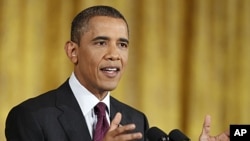In a White House news conference Wednesday, President Barack Obama again defended U.S. involvement in the NATO-led military operation in Libya and renewed a call for Libyan leader Moammar Gadhafi to step down.
Reporters pressed Mr. Obama about his administration's legal justifications for U.S. participation in the NATO military campaign, backed by a United Nations mandate.
Recounting the run-up to NATO-led military operations, he said he made clear to the American people that the initial phase of the operation with the U.S. in the lead would "take days not weeks".
The United States has no ground troops in Libya, a point he and administration officials have emphasized. Saying he kept his promise to transition to a NATO lead, Mr. Obama addressed the question of the definition of success.
The capacity of Libyan forces has been greatly reduced, he said, but he made clear that as long as Mr. Gadhafi remains in power, Libyan civilians will remain under threat. "As long as Gadhafi is still presenting himself as the head of the Libyan government and as long as he still controls large numbers of troops, the Libyan people are going to be in danger of counter-offensives, and retribution," he said.
Mr. Obama reiterated his position that he has not been in violation of the War Powers Act, saying the operation has not resulted in any U.S. casualties, with no risk of escalation, and remains "limited in time and scope. "We have done exactly what we said we would do, under a U.N. mandate and we have protected thousands of lives in the process, and as a consequence a guy who was a state sponsor of terrorist operations against the United States of America is pinned down, and the noose is tightening around him," he said.
Asked if any political settlement Libyans might arrive at, with Mr. Gadhafi involved, would be a success from the U.S. perspective, the president said the Libyan leader "needs to go."
The president was also asked about his decision to withdraw 10,000 troops by the end of this year from Afghanistan, and another 23,000 next year as part of an overall plan with NATO to transition to an Afghan security lead by 2014.
He noted that in his speech last week, and in 2009 when laying out his strategy, he never used the word "victory" but said the U.S. could be successful in a "narrowly drawn" mission.
The president said key objectives have been achieved, "severely crippling" al-Qaida capacities and building up Afghan forces, that make the U.S. drawdown possible. "We will draw them down in a responsible way that will allow Afghanistan to defend itself, and will give us the operational capacity to continue to put pressure on al-Qaida until that network is entirely defeated," he said.
Asked if the recent Taliban attack on the Intercontinental Hotel in Kabul caused him concern, Mr. Obama said the larger question is whether Afghan capacity is increasing.
Referring to similar attacks in Iraq, where the U.S. combat role is officially ended though just under 50,000 U.S. troops remain, he said neither place will be perfectly safe but in Afghanistan the U.S. can help improve the ability of people to defend themselves.
Obama Defends US Involvement in Libyan Conflict
- By Dan Robinson





